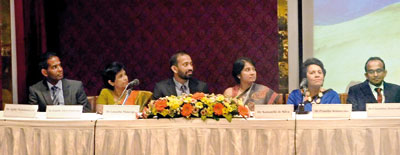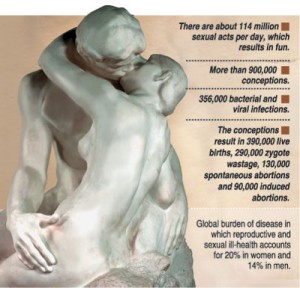News
Historic sexual medicine parley in Colombo
It is a hush-hush, taboo topic which Sri Lankans shy away from discussing not just with doctors but even within their bedrooms, though it is vital for the wellbeing of humans. Just mention ‘sex’ and the embarrassment is tangible.

Announcing the importance of SASSM 2017 (from left) areScientific Chair of the Conference, Dr. Ajith Malalasekera;Congress Chair Dr. Iyanthi Abeywickrama;President-elect of SASSM,Dr. Lasantha Malavige;Treasurer Dr. Samanthi deSilva;Social Chair of the Conference,Dr. Pramilla Senanayake; andChair of the Sub-Committee on Sponsorships, Dr. J.M.K.C. Jeewandara
This is what a path-breaking meeting of top medical specialists will bring not only to the table but also to the forefront next month.
‘New frontiers of sexual medicine – mind, body and science’ will be the theme of the three-day 3rd Biennial Meeting of the South Asian Society for Sexual Medicine (SASSM) which is scheduled to be held from November 19-21 at the Bandaranaike Memorial International Conference Hall (BMICH) in Colombo.
According to the World Health Organization “sexual health is a state of physical, mental and social well-being in relation to sexuality. It requires a positive and respectful approach to sexuality and sexual relationships, as well as the possibility of having pleasurable and safe sexual experiences, free of coercion, discrimination and violence”.
Calling it a “historic event”, Sexual Medicine Specialist Dr. Lasantha Malavige who will be inducted as the new President of SASSM, is quick to point out that such a meeting has not happened in Sri Lanka and will not be happening for another 10 years.
This is a unique opportunity for Sri Lankan doctors to come to grips with sexual medicine, he says, stressing that many are the people who suffer in silence due to sexual health issues. “We see only the tip of the iceberg and sexual health issues can manifest in different forms such as suicides, gender-based violence and drug and alcohol abuse,” Dr. Malavige told a briefing on Tuesday at the Sri Lanka Medical Association (SLMA) auditorium.
If these issues are looked at closely, it will point in the direction of sexuality problems which become disastrous, for both the individual and society, if not addressed adequately. This is why, through SASSM, this Sexual Medicine Specialist and his team are hoping to educate doctors and other personnel of all affiliated fields to improve their knowledge and skills to identify the problems early.
With experts and distinguished faculty from all over the world including the United States of America, the United Kingdom, the Netherlands, Australia, India, Bangladesh and also Sri Lanka turning the spotlight on the latest advances and future directions in sexual medicine, SASSM 2017 is targeting general practitioners, psychologists, psychiatrists, urologists, gynaecologists, andrologists, counsellors, educators, policy-makers, and many others interested in this crucial field who can take back this important message, it is learnt.
Representing sexual medicine doctors from one fourth of the world’s population, this large gathering of resource persons has on the cards a scientific programme on par with the best sexual medicine conferences, while making it regionally relevant.
The programme of SASSM, the Sunday Times understands, has taken into account the social and cultural sensitivities which are a vital part of society and will also be very specific to the cultures in the region.
A disturbing point brought out by Dr. Malavige is that since there is reluctance on the part of doctors, may be due to inadequate training, to deal with the sexual problems of their patients, these patients go to quacks.
Urging big corporates to think not only of corporate ‘social’ responsibility but also corporate ‘sexual’ responsibility, Dr. Malavige requested them to sponsor through the payment of the registration fee, a doctor or allied health worker to attend this all-important meeting which would ultimately benefit the people.
Reiterating that sexual health is fundamental to people’s health and happiness and has a positive impact on many aspects of their lives including reproductive health and wellbeing, Congress Chair Dr. Iyanthi Abeywickrama explained that sexual medicine is unique as it permeates throughout various medical specialties, such as urology, gynaecology, primary care, sexually transmitted infections, endocrinology, psychology and more.
“This specialty involves diagnosing, assessing and treating all aspects which relate to sexuality. Therefore, we hope that specialists in this field, doctors from other specialties and many more linked to sexual medicine and sexology would attend,” she said.
The Scientific Chair of the Conference, Dr. Ajith Malalasekera assured that SASSM 2017 would address many “hidden topics” through its exciting and comprehensive scientific programme consisting of plenaries, symposia, instructional courses, debates, abstract-driven sessions, e-posters and open discussions.
“There is a lack of information, knowledge and opportunity for training, with the losers being the patients,” he said, promising that a “glamorous array of stars” in the field would be participating at this biggest-ever sexual health conference. It will not be western dictated but keeping in touch with cultural and social needs relevant to our countries.
This is why “we need to get the word out” about this important meeting, Dr. Malalasekera added.
| A dangerous sport | |
| Taking up the importance of this relatively new specialty, the Social Chair of the Conference, Dr. Pramilla Senanayake said that at the population conference in 1994, there was no mention of sexual medicine, only contraception and family planning. Even today, sexual medicine is highly under-rated and that is why this conference is important. “Sri Lanka has made great strides in public health and reproductive health and also eradicated many diseases but a holistic approach to sexual health is still lacking,” she said, citing the global burden of disease in which reproductive and sexual ill-health accounts for 20% in women and 14% in men. Picking up a few issues, Dr. Senanayake said that some people are unable to vocalize what their problem is; sometimes they present with unrelated complaints; there is stigma and embarrassment; and service providers are not adequately trained. Sending ripples of laughter through the audience, she said that sex is “a dangerous sport”. There are about 114 million sexual acts per day, which results in fun, more than 900,000 conceptions; and 356,000 bacterial and viral infections. The conceptions result in 390,000 live births, 290,000 zygote (a fertilized egg or ovum cell) wastage, 130,000 spontaneous abortions and 90,000 induced abortions. The media has a major responsibility she stressed citing two examples of reporting elsewhere in the world: A big headline on the front-page of a newspaper had declared, ‘Woman dies after receiving contraceptive injection at clinic’. Later there was a rebuttal in small print: ‘She was murdered by her boyfriend.’ A Lancet article on breast cancer and the pill released to the press ahead of publication had elicited three different headlines from three newspapers: ‘Pill reduces breast cancer incidence – possible cure’, one newspaper had stated; while a second had said, ‘Pill can cause breast cancer, women beware’; and another had claimed, ‘Pill no effect on breast cancer’. The media can make or break a person and similarly can make or break a conference, said Dr. Senanayake, seeking support to spread the message about this crucial sexual health meet. SASSM represents India, Bangladesh, Afghanistan, Bhutan, Iran, Maldives, Nepal, Pakistan, Sri Lanka, Kazhakhistan, Kyrgyztan, Tajikistan, Turmenistan and Uzbekistan to encourage work on sexual medicine and reproductive health. A regional affiliate of the International Society of Sexual Medicine (ISSM), SASSM has as its mission the promotion and expansion of the practice of sexual medicine in South Asia. The previous SASSM meetings have been held in Bengaluru, India (2013), Dhaka, Bangladesh (2015) and an interim congress in Mysore, India (2016). (For more details on the congress, please visit www.sassm2017.org or call +94 785 373 959) |


